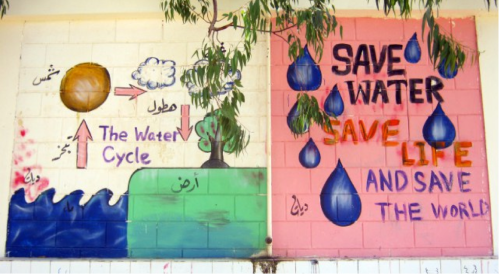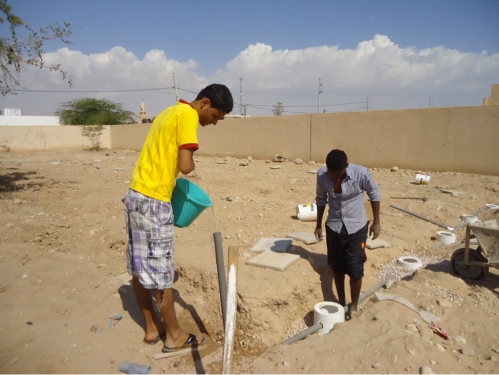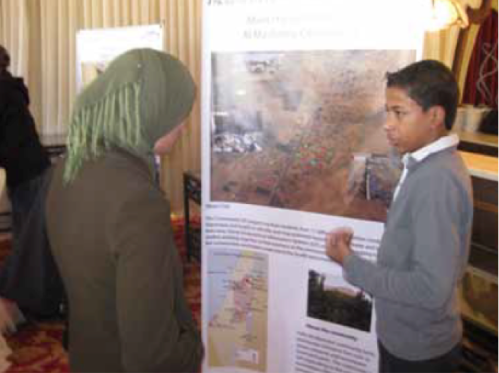Save Water. Save Life. Save the World. This simple but effective message is painted on the wall of Halima Al-sa’adiah School in Sharhabil bin Hassneh, one of the 28 cross-border communities participating in FoEME’s “Good Water Neighbors” project. Next to it is a painting of the hydrologic cycle. The wall of artwork surrounds an eco-garden that also serves as an outdoor classroom, it is a place where students can learn about environmental issues under the shade of a palm tree umbrella on seats made from recycled tires. Examples of these “eco-facilities” are found throughout the Jordan Valley in schools, green spaces and community centers. Their purpose is to raise environmental awareness by showcasing water conservation techniques such as rainwater harvesting and grey water reuse as well as incorporating recycled materials. The construction of eco-facilities is hands-on, engaging youth in ecological building practices and thereby providing the necessary skills to replicate the concepts across communities. FoEME is hand-picking future environmental stewards through its youth “Water Trustees” educational program. In addition to their involvement with eco-facilities, trustees spend a year studying the WaterCare curriculum – a textbook focused on regional water conservation issues along with a Teacher’s resource guide that contains practical activities.
Art work is used in eco-facilities to raise awareness and educate students on the importance of water conservation.
Communicating environmental awareness and activism can be very difficult for communities that have never been exposed to ideas of environmental stewardship, responsibility, and cooperation. Thus FoEME uses different methods for teaching local partners in order to increase comprehension and interest in projects. Adult programs focus on the rational, practical side of conservation and responsible water management, while youth programs aim to open students’ minds to new possibilities and ways of thinking to build leaders. Education builds local knowledge of environmental issues with the younger generation, who will then disseminate the ideas both upstream (to their elders) and downstream (to their peers), and should be qualitative instead of quantitative.
Water Trustees build and test a grey water system in Ghor Fifa.
In order to communicate these ideas in a manner that youth will understand, it is best to get kids slightly outside of their comfort zone, where they will begin to make new associations. An example of this type of teaching was used recently with water trustees in South Shouneh for an activity about solid waste and trash reduction. The activity was aimed at getting youth to think more about where things come from and the cycle that materials go through from cradle to grave. Program assistants asked students to identify where they thought a common product (such as a shirt, a banana, and pack of sugar) came from in a physical, interactive activity. Students then explained their reasoning, and it was revealed how far the product had actually travelled to reach their village. This activity (involving moving, feedback, and reflection) subverted assumptions, and also was a break from the traditional style of teaching that most students are used to in Jordan.
Building ecological knowledge and awareness at a young age is important for changing the long-term behaviors and perceptions of the local community. The Good Water Neighbors Youth Water Trustees program is grassroots activism at its most exciting; encouraging collaboration, innovative thinking, and environmental responsibility. In 2009, FoEME added another level of environmental education for Water Trustees with its Community Geographical Information System (CGIS) project, which trains students and teachers in the use of GIS and GPS technology. This empowers participants to recognize and document environmental threats in their communities. The project further encourages youth to make recommendations to resolve these challenges, some of which have been adopted by the local municipality.
Tayseer Nawasrah, a student from Tabkat Fahal Municipality presents his community’s GIS map.
FoEME is working to spark a new generation of environmental leaders who will take environmental protection, conservation, and responsibility into their own hands. Future plans for expansion of the program include assisting graduated water trustees with the scholarship search so that the most motivated students can attend university to study environmental sciences, continue to make an impact in their community and eventually transition to the next generation of community coordinators.
This post was contributed by FoEME interns Laurel Wolf and Brittany Ajroud at the Amman office.


